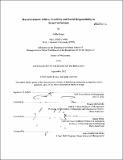Moral frictions : ethics, creativity and social responsibility in stem cell science
Author(s)
Evans, Joëlle
DownloadFull printable version (12.73Mb)
Alternative title
Ethics, creativity and social responsibility in stem cell science
Other Contributors
Sloan School of Management.
Advisor
Wanda Orlikowski and Susan Silbey.
Terms of use
Metadata
Show full item recordAbstract
Competing moral orders pervade markets and organizations. Previous studies of morals and markets show that organizational and occupational communities in contested areas promote one unique moral perspective in order to gain legitimacy and ensure organizational survival. In this perspective, change and innovation are only possible when distinct actors with a competing moral perspective enter a market. Yet communities do sometimes produce innovations at odds with the moral position they promote. How do they achieve this? Drawing on a 17-months ethnography of a stem cell laboratory, I explore the ways in which competing moral orders intersect in the workplace and how this collision shapes work and innovation practices. I examine two distinct moral conflicts: conflicts over safety and conflicts over bioethics. These two different types of conflicts suggest together that, far from being ethical deserts where workers conform to their organization's perspective, workplaces dealing with contested objects and technologies are spaces of intense ethical questioning and negotiation. Local moral contests are rich with creative opportunities: organizational actors innovate and shape their organizations as they seek to couple the practices and goals of their organization with their avowed personal values. This dissertation contributes to unpacking the links between morals and organizations by showing that moral legitimacy is not just a post-hoc justification of organizational products or practices but is integral to the constitution of these products and practices. This work also contributes to studies of expert work by highlighting the role of moral heterogeneity, local contests, authority over tasks, and technological innovation on the definition of social responsibility in expert communities.
Description
Thesis (Ph. D.)--Massachusetts Institute of Technology, Sloan School of Management, 2012. Cataloged from PDF version of thesis. Includes bibliographical references (p. 237-250).
Date issued
2012Department
Sloan School of ManagementPublisher
Massachusetts Institute of Technology
Keywords
Sloan School of Management.